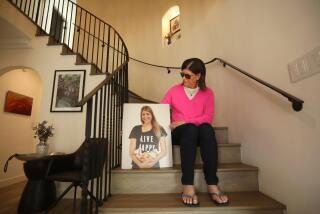System May Have Died, but Grief Lingers
- Share via
She is the mother of teen-agers, or so I assume. She offered a few hints along with the $40 that she sent me through the mail.
The cash, anonymous and untraceable, was a donation for a woman with multiple sclerosis whom I had written about weeks before.
The letter writer’s message was anonymous too, yet traceable to many people we may see but not really know. These people keep their secrets for as long as they can, until time gives them up. They are scared and, yes, embittered.
They know that America can be a cruel place to fall ill.
The letter writer said she was struck by the opening phrase of the column. It was a quote from a woman who was trying to help: “The system has died.”
“About three years ago, on the way to work--it was a cold month, I don’t remember which--I saw a woman propped against a small tree next to the street,” the letter writer says.
“Nailed to the tree was a sign, something like, ‘Help. Homeless. Have MS.’ I saw that woman there for at least four chilly mornings as I drove to work.
“I never stopped; I wanted her to disappear. This was my town, a nice town, not a place for beggars. I did not know what MS was, but I was sure that there must be help for someone who had such a disease. She just needed to get plugged into the system.
“Eventually she did disappear--to where I don’t know, but I have never forgotten the image of that half-frozen, immobile figure with legs straight out, propped against that tree. . . . Within a few weeks, I found out what MS was. I was told that I probably have it.”
The letter writer says the signs of the disease were easy to ignore. She thought that maybe she was just getting old. Her glasses, she thought, needed more correction; her vision was blurred. The ophthalmologist sent her to a neurologist, who ordered an MRI, a high-tech a brain scan. The rest was up to her.
“I was feeling fine and decided not to play along with the test-happy medical system,” she writes. “I canceled my MRI appointment in favor of a hiking trip, the last I would ever take. It was a lucky decision.
“Denial held for several weeks, but eventually I got to the library and looked up multiple sclerosis . I read for two hours but knew within 15 minutes that it was true. All the little, almost unnoticed complaints--fatigue, balance problems, eye pain, wrist pain, slight numbness, heat sensitivity--fell together like the last few pieces of a jigsaw puzzle.
“It was not aging, or the stress of raising teen-agers. It was MS.
“Years ago, someone wrote a book, I think, . . . titled ‘First, You Cry.’ That may have been true then, but these days, if you are a single mother, first you read your insurance policies. I am an avid reader. I know about health insurance records and central information systems. I knew that I did not want MS on my records. I decided not to go for the MRI. I decided to keep it a secret.
“I knew that even the suspicion of such a disease would mean that I could never change jobs, never get additional insurance of any kind, get promoted, never make a mistake without people wondering about my deteriorating brain. There is no cure for MS--even the cause is unknown--and there is no treatment that makes much of a difference.
“Why should I tell?”
This is a question that I have heard before, from strangers mostly, people who tell me such secrets out of a frustration that screams for release.
They might be infected with the virus that causes AIDS, or perhaps cancer has invaded their cells. They might have a mental disorder. The list goes on. People look at you differently, they say; systems shut you out.
People don’t want pity, they want respect.
“So I struggle through overwhelming fatigue to keep up with my job, the job that provides my health insurance,” the letter goes on. “When the day comes that I can no longer work, I’ll be able to continue my insurance for about two years, if I can afford to pay for it. Then I’ll have nothing.
“Unfortunately, MS does not kill you, at least not quickly. I will get a small pension--just enough to make sure that I’ll never qualify for MediCal, not that it would do much good. The papers are full of stories about people who cannot find a doctor who will accept MediCal patients.
“No matter how disabled I get, I’ll never qualify for Medicare Disability either. I have not worked under Social Security under the last 10 years.
“My pension will allow me to make the modest payments on my small home, at least until I am forced to get a loan on the house to pay medical bills. Eventually, the money will run out. When that happens, I know where there is a little tree that I can lean against.
“I wonder how many days I’ll last, and where they’ll take me when enough people want me to disappear.
“Yes, Dianne, the system has died.”
More to Read
Sign up for Essential California
The most important California stories and recommendations in your inbox every morning.
You may occasionally receive promotional content from the Los Angeles Times.






